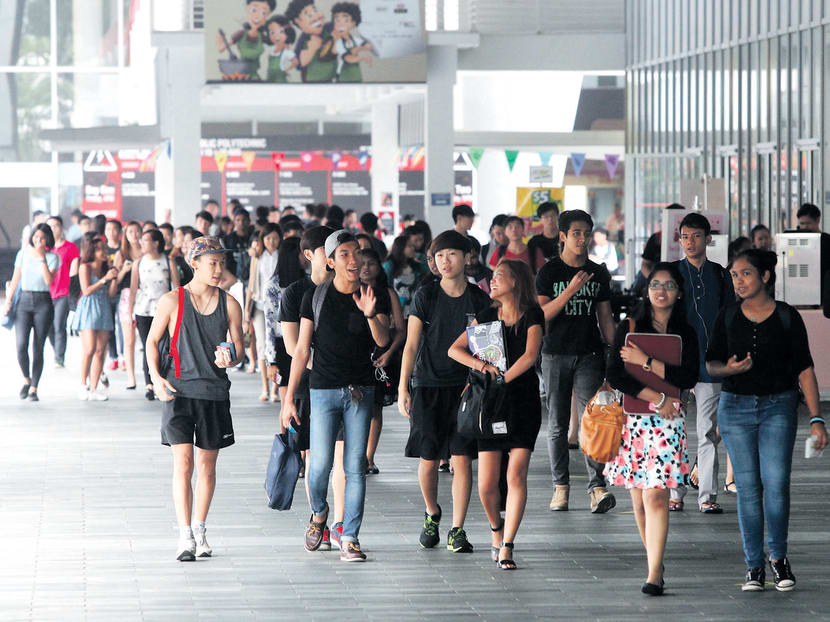Tripartite panel to promote skills-based career advancement
SINGAPORE — To help Singaporeans achieve their potential, economic growth is not enough. A cultural change is needed to ensure the nation remains a place where everyone can feel proud of what they do and is respected for their contributions and character.

Republic Polytechnic students on campus. Mr Lee noted that polytechnics and ITEs here are world-class and graduates from these institutions had performed well at the workplace. PHOTO: Ooi Boon Keong
SINGAPORE — To help Singaporeans achieve their potential, economic growth is not enough. A cultural change is needed to ensure the nation remains a place where everyone can feel proud of what they do and is respected for their contributions and character.
Prime Minister Lee Hsien Loong made this point at the National Day Rally yesterday, as he announced the setting up of a tripartite committee to develop an integrated system of education, training and career progression for all Singaporeans. It will also promote industry support and social recognition for individuals to advance in their careers based on skills.
The committee will be headed by Deputy Prime Minister and Finance Minister Tharman Shanmugaratnam and will involve the Government, employers and unions.
Citing the example of Keppel Corp, which is the world’s largest builder of jack-up oil rigs, Mr Lee noted that the firm’s success had allowed it to create structured career pathways for its employees, so they could progress in their careers by acquiring deep skills and knowledge.
In the same vein, Singapore’s economy must be competitive, as economic growth will create opportunities for workers to rise through the ranks, he said, stressing that the country must always be a place where “anyone can improve his life if he works hard” and everyone can hope for a better future.
Delivering the most important political speech of the year at ITE College Central for the second year running, Mr Lee said it was an apt location, given that his speech touched on education at polytechnics and Institutes of Technical Education (ITEs).
He noted that polytechnics and ITEs here are world class and graduates from these institutions had performed well at the workplace.
“We want to help them create a brighter future for themselves, by many routes,” he said. “Not just (via)the academic route, but also alternatively by getting good jobs, mastering deep skills, performing well and then getting relevant qualifications along the way as they work, as they advance in their careers.”
In his Mandarin speech, Mr Lee cited precision engineering firm Makino Asia as an example of small and medium enterprises that valued practical experience and ability when considering employees for promotion — which is based not only on academic qualifications such as a university degree.
Mr Lee acknowledged that many parents would like their children to go to university, with polytechnic and ITE graduates also hoping to further their studies. He said the Government would help more students to realise their dream, but cautioned that some countries had produced graduates who could not find jobs.
“We have to recognise (the) fact that everyone’s interests and aptitudes are different. Not everyone is suited for university studies,” he said, adding that not all university degrees have the same value and having one does not guarantee a smooth career.
Adding that he wanted to talk about this issue frankly, Mr Lee said many good jobs do not require university degrees and going to a university is not the only path to a bright future.
The Applied Study in Polytechnics and ITE Review Committee, chaired by Ms Indranee Rajah, Senior Minister of State (Education and Law), is studying how to create a work-and-study path for students, said Mr Lee. It will announce its recommendations soon.
The Prime Minister also noted that the committee would be set up to help students make better education and career decisions. It also aims to help them progress and upgrade their skills after they graduate and start work, as well as develop structured career paths for them.
Mr Lee said implementing the work-and-study path on a national scale is not easy as it involves multiple stakeholders and government agencies, such as the Education, Manpower, as well as Trade and Industry ministries.
Companies have to develop and value every worker, as well as create corporate values, cultures and training systems, while unions have to be fully behind the effort and champion lifelong learning, he said.






